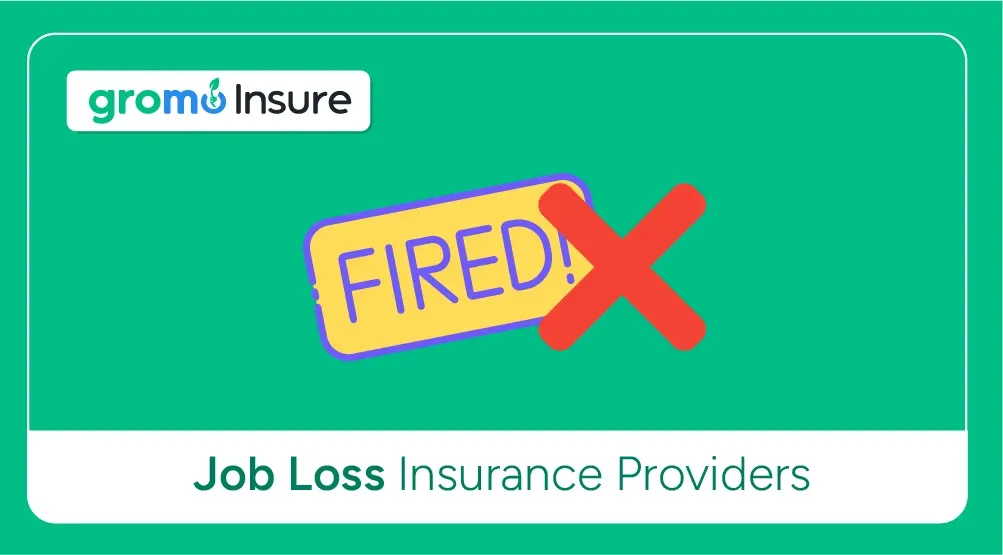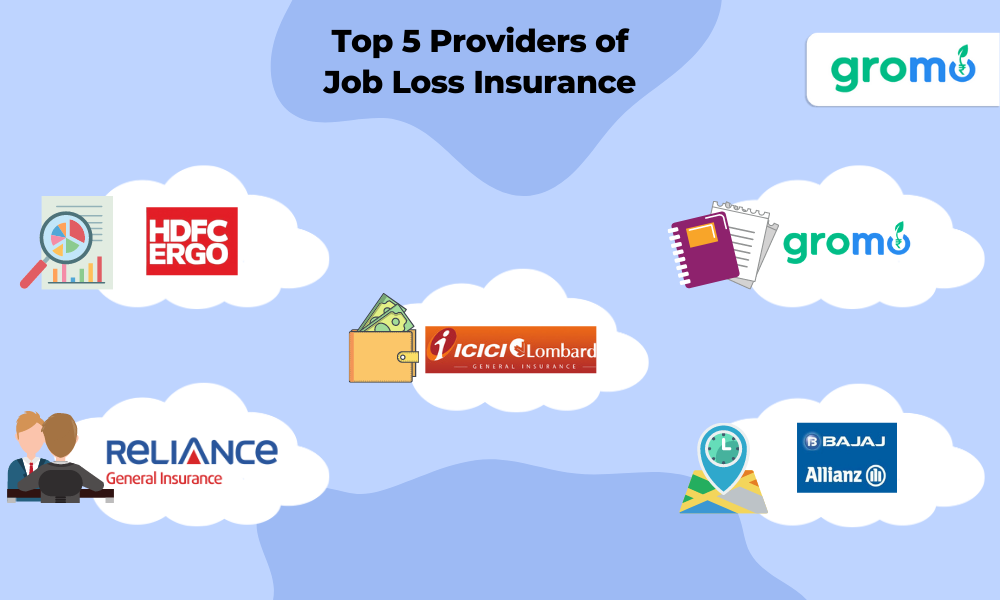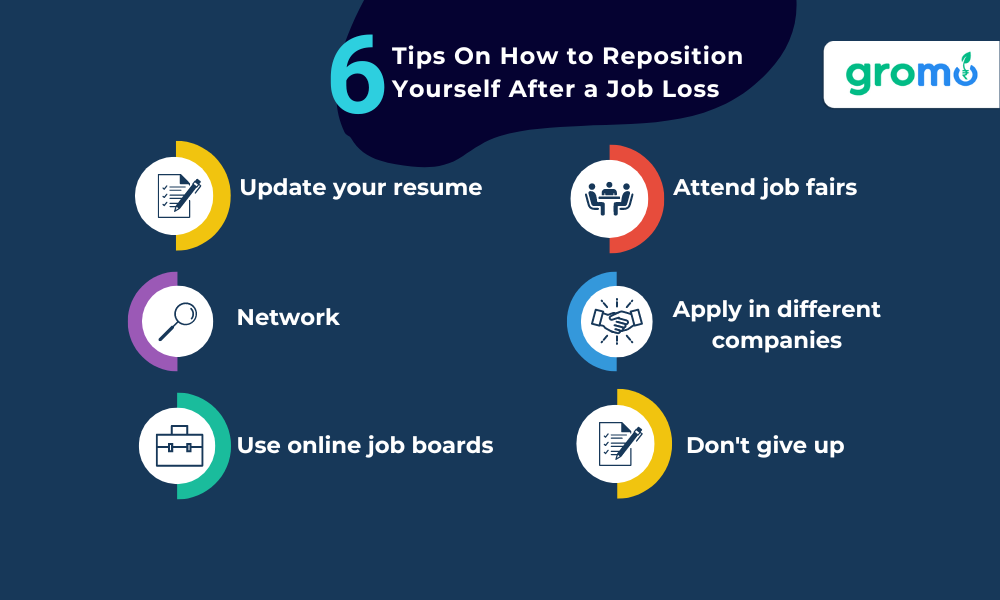Top Providers of Job Loss Insurance: 4 Best Providers In India
How Job Loss Insurance Works Job loss insurance is a type of insurance that provides financial assistance to people who have lost their jobs

Job loss can be a stressful and financially difficult experience. Job loss insurance can help to ease some of the financial burden by providing a monthly payout for a period of time. In India, there are a number of different job loss insurance providers to choose from. Here are five of the best providers:
HDFC ERGO
HDFC ERGO is one of the largest insurance providers in India. They offer a variety of job loss insurance policies, including policies that provide a monthly payout for up to 12 months.
GroMo
GroMo is India’s leading fintech platform that enables its users to earn money online just by selling financial products. So if you’re looking for an online platform that can help you in making money online, then GroMo’s online mobile application can be the solution for your needs. GroMo helps its users to earn money in a very unique way.
Reliance General Insurance
Reliance General Insurance is another large insurance provider in India. They offer a variety of job loss insurance policies, including policies that provide a monthly payout for up to 12 months.
Bajaj Allianz
Bajaj Allianz is a leading insurance provider in India. They offer a variety of job loss insurance policies, including policies that provide a lump sum payout in case of involuntary job loss.
ICICI Lombard
ICICI Lombard is a large insurance provider in India. They offer a variety of job loss insurance policies, including policies that provide a monthly payout for up to 12 months.
New India Assurance
New India Assurance is one of the oldest and largest insurance providers in India. They offer a variety of job loss insurance policies, including policies that provide a monthly payout for up to 12 months.
When choosing a job loss insurance policy, it is important to compare the different policies available and to choose a policy that meets your needs.
Some factors to consider when choosing a policy include:
- The length of the coverage period
- The amount of the monthly payout
- The cost of the policy
- The terms and conditions of the policy
- It is also important to talk to a financial advisor to get their advice on choosing the right job loss insurance policy for you.
Here are some of the benefits of having job loss insurance:
-
Financial security: Job loss insurance can provide you with financial security in case you lose your job. This can help you to cover your living expenses and to pay for your debts.
-
Peace of mind: Job loss insurance can give you peace of mind knowing that you will have financial support in case you lose your job. This can help you to focus on finding a new job and to avoid stress.
-
Tax benefits: In some cases, job loss insurance may be tax-deductible. This can save you money on your taxes.
If you are concerned about the possibility of losing your job, job loss insurance may be a good option for you. It can provide you with financial security and peace of mind.
How Job Loss Insurance Works
Job loss insurance is a type of insurance that provides financial assistance to people who have lost their jobs. The amount of assistance that is provided depends on the policy that is purchased. Some policies provide a monthly payout for a set period of time, while others provide a lump sum payment.
Job loss insurance can be a valuable tool for people who are concerned about the possibility of losing their jobs. It can provide financial security and peace of mind, which can help people to focus on finding a new job and to avoid stress.
How to Choose a Job Loss Insurance Policy
There are a number of different job loss insurance policies available, so it is important to compare the different policies before choosing one. Some factors to consider when choosing a policy include:
-
The length of the coverage period: Some policies provide coverage for a set period of time, such as 12 months. Others provide lifetime coverage.
-
The amount of the monthly payout: The amount of the monthly payout will vary depending on the policy. Some policies provide a small monthly payout, while others provide a large monthly payout.
-
The cost of the policy: The cost of job loss insurance will vary depending on the policy. Some policies are very affordable, while others are more expensive.
-
The terms and conditions of the policy: It is important to read the terms and conditions of the policy carefully before choosing one. This will help you to understand what is covered by the policy and what is not.
How to File a Claim for Job Loss Insurance
If you lose your job, you will need to file a claim for job loss insurance. The process for filing a claim will vary depending on the insurance company. However, in general, you will need to provide the following information:
- Your policy number
- Your name
- Your Social Security number
- The date you lost your job
- The reason you lost your job
- Your income
- Your expenses
Once you have filed a claim, the insurance company will review your claim and determine whether or not you are eligible for benefits. If you are eligible for benefits, the insurance company will start paying you benefits.

Tips for Managing Job Loss
If you lose your job, there are a few things you can do to manage your finances and to find a new job:
-
Create a budget: This will help you to track your income and expenses.
-
Create a savings account: This will help you to save money in case you lose your job again.
-
Update your resume: Make sure your resume is up-to-date and that it highlights your skills and experience.
-
Network: Talk to your friends, family, and former colleagues about your job search.
-
Use online job boards: There are a number of online job boards that can help you to find a new job.
-
Apply for unemployment benefits: If you are eligible for unemployment benefits, this can help you to pay your bills while you are looking for a new job.
Losing your job can be a stressful experience. However, by taking steps to manage your finances and to find a new job, you can make the transition easier.
Job loss insurance can be a valuable tool for people who are concerned about the possibility of losing their jobs. It can provide financial security and peace of mind, which can help people to focus on finding a new job and to avoid stress.
When choosing a job loss insurance policy, it is important to compare the different policies available and to choose a policy that meets your needs. Some factors to consider when choosing a policy include the length of the coverage period, the amount of the monthly payout, the cost of the policy, and the terms and conditions of the policy.
If you lose your job, there are a few things you can do to manage your finances and to find a new job. These include creating a budget, creating a savings account, updating your resume, networking, using online job boards, and applying for unemployment benefits.
Looking for an app for earning online? GroMo is your answer! Now earn with each sale by selling various kinds of financial products

How to Get a Job After Losing Your Job
If you have lost your job, you may be wondering how to get a new one.
Here are a few tips:
-
Update your resume: Make sure your resume is up-to-date and that it highlights your skills and experience. You may also want to have a professional resume writer review your resume.
-
Network: Talk to your friends, family, and former colleagues about your job search. They may know of open positions or be able to put you in touch with someone who does.
-
Use online job boards: There are a number of online job boards that can help you find a new job. You can search by keyword, location, and other criteria.
-
Attend job fairs: Job fairs are a great way to meet with potential employers and learn about open positions.
-
Don't give up: The job search can be tough, but don't give up. Keep applying for jobs and networking, and eventually you will find a new job.
How to Deal with the Emotional Impact of Job Loss
Losing your job can be a very emotional experience. You may feel a range of emotions, including sadness, anger, anxiety, and fear. It is important to allow yourself to feel these emotions and to find healthy ways to cope with them.
Here are a few tips for dealing with the emotional impact of job loss:
-
Talk to someone you trust: Talking to a friend, family member, therapist, or career counselor can help you to process your emotions and to develop a plan for moving forward.
-
Take some time for yourself: After losing your job, it is important to take some time for yourself. This may mean spending time with loved ones, doing things you enjoy, or simply relaxing.
-
Don't be afraid to ask for help: If you are struggling to cope with the emotional impact of job loss, don't be afraid to ask for help. There are a number of resources available to help you, including your employer, your state's unemployment office, and mental health professionals.
Remember, you are not alone. Millions of people lose their jobs each year. By taking care of yourself both physically and emotionally, you will be better able to cope with the challenges of job loss and to find a new job.
Losing your job can be a difficult experience, but it is important to remember that you are not alone.
Millions of people lose their jobs each year, and there are a number of resources available to help you. By taking care of yourself both physically and emotionally, you will be better able to cope with the challenges of job loss and to find a new job.
Here are some additional tips for dealing with job loss:
Don't panic: It's normal to feel overwhelmed and anxious after losing your job, but it's important to try to stay calm and focused. Panicking will only make things worse.
Take some time to figure out what you want: Once you've had some time to process the news, take some time to think about what you want to do next.
Do you want to stay in the same field? Do you want to make a career change? Once you know what you want, you can start to develop a plan.
Don't be afraid to ask for help: There are a number of people who can help you through this process, including your friends, family, former colleagues, and career counselors. Don't be afraid to reach out for help when you need it.
Don't give up: The job search can be tough, but it's important to keep going. Don't give up on your dreams. Keep applying for jobs and networking, and eventually you will find the perfect job for you.
Remember, losing your job is not the end of the world. It's just a setback. With time and effort, you will get through this and come out stronger on the other side.
Update your skills: If you have been in the same job for a while, it may be a good idea to update your skills. This will make you more marketable to potential employers.
There are a number of online courses and tutorials that can help you to update your skills.
Volunteer: Volunteering is a great way to stay active and to network with potential employers. It can also help you to boost your confidence and to feel good about yourself.
Take care of your health: It is important to take care of your physical and mental health during this time. Make sure to eat healthy, get enough sleep, and exercise regularly. You may also want to talk to a therapist or counselor if you are struggling to cope with the emotional impact of job loss.
Losing your job can be a difficult experience, but it is important to remember that you are not alone. Millions of people lose their jobs each year, and there are a number of resources available to help you.
By taking care of yourself both physically and emotionally, you will be better able to cope with the challenges of job loss and to find a new job.
To sell this product, and many other financial products. DOWNLOAD GROMO. Where you can sell and earn a substantial income sitting at home
Here are the key differences between a coder and a programmer:
Coder: A coder is someone who writes code. They are responsible for translating human-readable instructions into machine-readable code.
Coders typically have a basic understanding of programming languages and algorithms.
Programmer: A programmer is someone who designs, develops, and tests software applications. They are responsible for the entire software development process, from conception to deployment. Programmers typically have a more in-depth understanding of programming languages, algorithms, and software design principles.
In general, coders are responsible for the more technical aspects of software development, while programmers are responsible for the more strategic and creative aspects. However, the lines between these two roles can be blurred, and many coders and programmers have skills in both areas.
Here are some additional details about the differences between coders and programmers:
1 Education: Coders typically have a bachelor's degree in computer science or a related field. Programmers may have a bachelor's degree in computer science, but they may also have a master's degree or a Ph.D. in computer science or a related field.
2 Skills: Coders typically have strong skills in programming languages and algorithms. Programmers typically have strong skills in programming languages, algorithms, software design, and software engineering.
3 Responsibilities: Coders are responsible for writing code. They may also be responsible for debugging code and testing code. Programmers are responsible for the entire software development process, from conception to deployment. They may also be responsible for managing a team of developers.
Ultimately, the difference between a coder and a programmer is a matter of degree. There is no clear-cut distinction between the two roles, and many people have skills in both areas. However, the general trend is that coders are responsible for the more technical aspects of software development, while programmers are responsible for the more strategic and creative aspects.
KEY TAKEAWAYS
-
Compare interest rates and loan terms from different providers. The interest rate and loan term are two of the most important factors to consider when choosing a vehicle loan. It is important to compare rates and terms from different providers to find the best deal.
-
Consider your credit score. Your credit score will have a major impact on the interest rate you are offered for a vehicle loan. If you have a good credit score, you will likely be offered a lower interest rate.
-
Shop around for the best deal. Don't just go with the first provider you find. It is important to shop around and compare rates and terms from different providers to find the best deal.
-
Read the fine print. Before you sign any paperwork, be sure to read the fine print and understand all of the terms and conditions of the loan.
-
Make sure you can afford the monthly payments. Before you take out a vehicle loan, be sure to make sure you can afford the monthly payments. Make a budget and make sure you have enough money left over after you pay your other bills.





